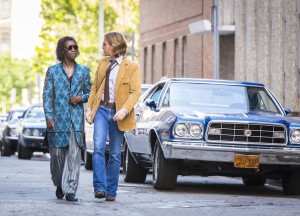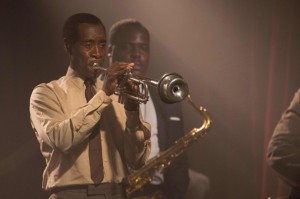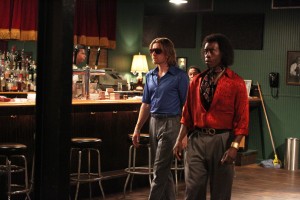![]()
The next few weeks are stuffed with musically-themed projects. In addition to the biopic Miles Ahead, we’ll soon have the fictional Sing Street and Green Room, another couple of features placing musicians at the forefront of their stories. This effort gets things off to a solid, if unexceptional start, depicting a period in the life of trumpeter Miles Davis.
 The story begins in the 1970s with reporter Dave Brill (Ewan McGregor) desperately attempting to interview renowned and reclusive musician Miles Davis (Don Cheadle). Intercepting and convincing the wild and unpredictable Davis isn’t easy, but the two form a rapport. Events take a more serious turn when a mysterious recording from the artist is stolen and the two go on a wild and dangerous mission to retrieve it.
The story begins in the 1970s with reporter Dave Brill (Ewan McGregor) desperately attempting to interview renowned and reclusive musician Miles Davis (Don Cheadle). Intercepting and convincing the wild and unpredictable Davis isn’t easy, but the two form a rapport. Events take a more serious turn when a mysterious recording from the artist is stolen and the two go on a wild and dangerous mission to retrieve it.
It’s a great concept, allowing the characters to get themselves in some crazy situations while revealing more about each other. As expected, Cheadle does a superb job at embodying Davis. He’s completely convincing and you quickly forget that you’re watching an actor’s take on the music legend. His elder Davis is passionate, funny and at times scary. It’s a meaty role with plenty of drama for the performer and he takes it on with aplomb. McGregor is also enjoyable as the reporter, constantly juggling his comments and approach to try and coax more answers out of his subject. There’s a lot of tension in these sequences since we’re never quite sure how Davis is about to react to situations and questions being raised.
 Unfortunately, the movie is a little disappointing in that it doesn’t focus more on the drug-addled showdowns and confrontations with the elder Davis. The movie synopsis suggests that we’re merely following a few days in the musician’s life, but that’s misleading. It often goes on tangents decades earlier, portraying early days in Davis’ career as well as his budding relationship with Francis Taylor (Emayatzy Corinealdi). The movie breaks away for long periods to develop the romance and the trumpeter’s wandering eye. This material is all capably handled, but feels unadventurous by comparison. Every time we travel to the past, the material is not nearly as compelling as sequences that feature the man in an unpredictable and unhinged state.
Unfortunately, the movie is a little disappointing in that it doesn’t focus more on the drug-addled showdowns and confrontations with the elder Davis. The movie synopsis suggests that we’re merely following a few days in the musician’s life, but that’s misleading. It often goes on tangents decades earlier, portraying early days in Davis’ career as well as his budding relationship with Francis Taylor (Emayatzy Corinealdi). The movie breaks away for long periods to develop the romance and the trumpeter’s wandering eye. This material is all capably handled, but feels unadventurous by comparison. Every time we travel to the past, the material is not nearly as compelling as sequences that feature the man in an unpredictable and unhinged state.
 It also doesn’t help that the real Davis appears so unwilling to talk in depth about his music. We don’t get a lot of information relating to the process of how he created some of his famous records. Obviously, there isn’t a whole lot that the filmmakers can do about it, but a bit more emphasis on the music itself might have been enlightening. At least the cast are interesting enough to keep our attention during the movie’s predictable turns.
It also doesn’t help that the real Davis appears so unwilling to talk in depth about his music. We don’t get a lot of information relating to the process of how he created some of his famous records. Obviously, there isn’t a whole lot that the filmmakers can do about it, but a bit more emphasis on the music itself might have been enlightening. At least the cast are interesting enough to keep our attention during the movie’s predictable turns.
Miles Davis’ music was free-flowing, improvisational and prided itself on not being stuck on conventions and forms of the past. This motto is even stated by the lead character on multiple occasions. While Miles Ahead is good, one wishes that it had taken its subject’s approach a little more to heart and delved deeper into the artist’s troubled head. When the movie is wild and freewheeling, it’s far more engaging than when it tries to hit the typical biopic beats.


